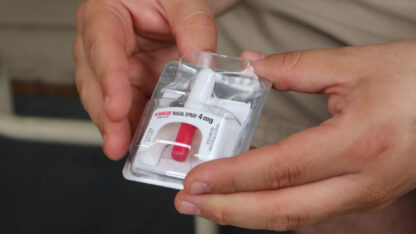A rural south Georgia hospital authority is challenging a 2022 state law that barred local officials from suing opioid manufacturers and distributors.
The hospital authority of Wayne County filed its federal lawsuit seeking damages in the spring of 2019 for the strain put on the Wayne Memorial Hospital in Jesup, which is about 40 miles northwest of Brunswick.
Wayne County, which is home to about 31,000 people, had an opioid-involved overdose rate – 23 per 100,000 – that was higher than the state average of 16.8 in 2021, according to the most recent annual report compiled by the state Department of Public Health. It also had a higher-than-average number of emergency room visits for opioid overdoses that year.
But the state had filed its own lawsuit against opioid manufacturers and distributors a few months before Wayne County hospital authority’s claim, and it took the pharmaceutical companies to court while also participating in multistate settlement negotiations that ultimately led to a $26 billion deal.
The 2022 law blocking local governments from filing their own lawsuits was passed as part of the terms of those negotiations as a way to resolve the lawsuits filed by thousands of governmental plaintiffs nationally. In Georgia, all but two litigating governmental entities – the Wayne County Hospital Authority and the Bibb County School District – opted to participate.
The pharmaceutical companies are now trying to have the Georgia rural hospital authority’s lawsuit tossed out, pointing to Georgia’s state law. And the question of where that leaves the local authority landed before the Georgia Supreme Court, which heard oral arguments in the case Tuesday. A ruling will come later.
Robert Smith, an attorney for the hospital authority, argued the law is unconstitutional because the local body is essentially a private corporation.
“They had rights that existed – constitutional rights – that can’t be taken away,” Smith said to the justices Tuesday.
Some of the justices questioned the logic of the argument.
“Are you arguing that because the General Assembly gave to hospital authorities, in some circumstances, private rights, they are people and because the Constitution talks about people, they now have constitutional rights, even though the authority that was granted to them was by statute?” asked Justice Sarah Hawkins Warren.
“Correct, they have rights the same as a private corporation,” Smith replied.
Former Chief Justice Harold Melton, who stepped down in 2021, represented the pharmaceutical companies before his former colleagues. The state Attorney General’s Office, which negotiated the settlement agreement, is also asking the court to end the local hospital authority’s attempt to go it alone.
Attorney General Chris Carr announced last January that the state of Georgia had joined the $26 billion multistate settlement agreement with Cardinal, McKesson and AmerisourceBergen – the nation’s three major pharmaceutical distributors – and opioid manufacturer and marketer Johnson & Johnson.
The state is expected to receive $636 million through the agreement.
Carr has argued that the state-level approach would enable Georgia to maximize the amount of relief gleaned from opioid makers and marketers who are accused of downplaying the addictive nature of the drugs and ignoring suspicious levels of consumption of their product.
“Not only does the status of millions in funding for the State hang in the balance, but the State’s ability to meaningfully join settlements is at issue,” the state wrote in its brief to the state Supreme Court, submitted as a “friend” of the court.
“If the State cannot speak with one voice, then no private party will be able to trust the State’s word, even when it is written into a statute. Sign an agreement with the State today, get sued by a rogue municipality tomorrow.”
Opioid overdoses remain high nationally. In Georgia, there were 2,390 drug overdose deaths in 2021, and 71% were attributed to opioids and 57% were attributed to fentanyl, according to DPH.









